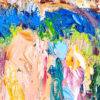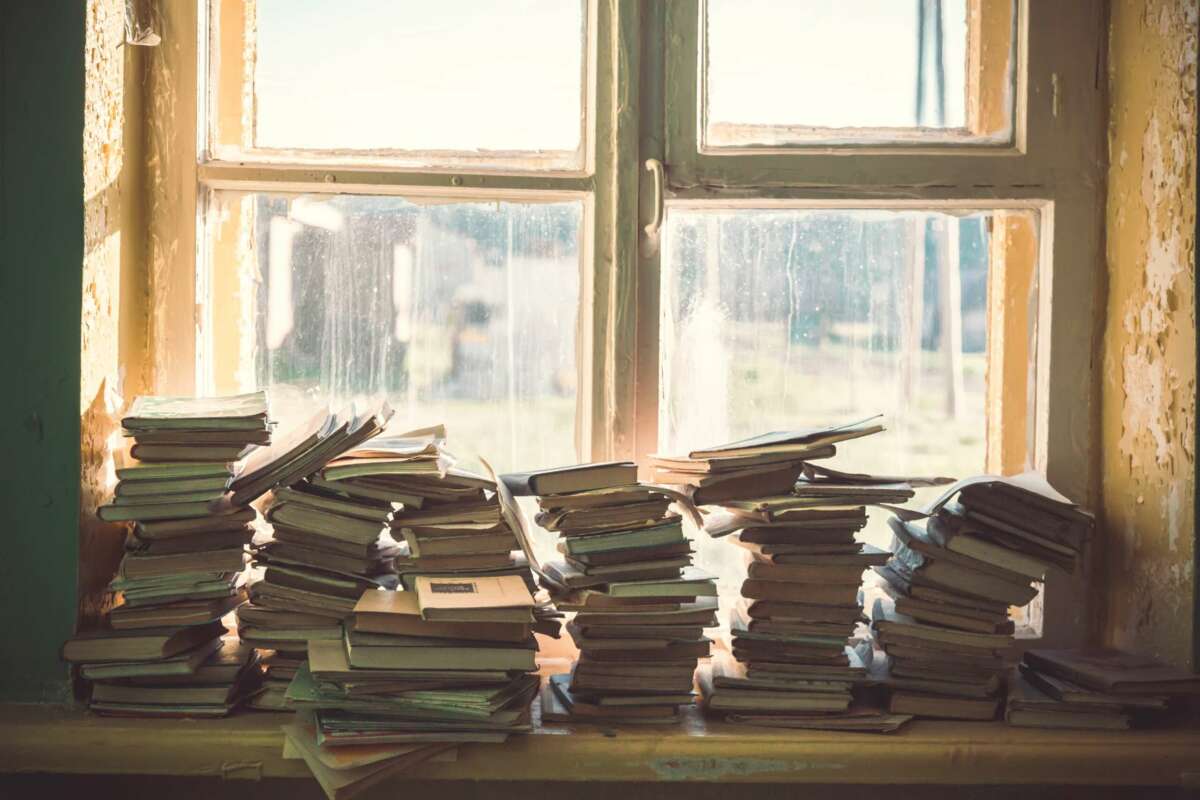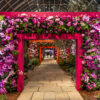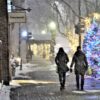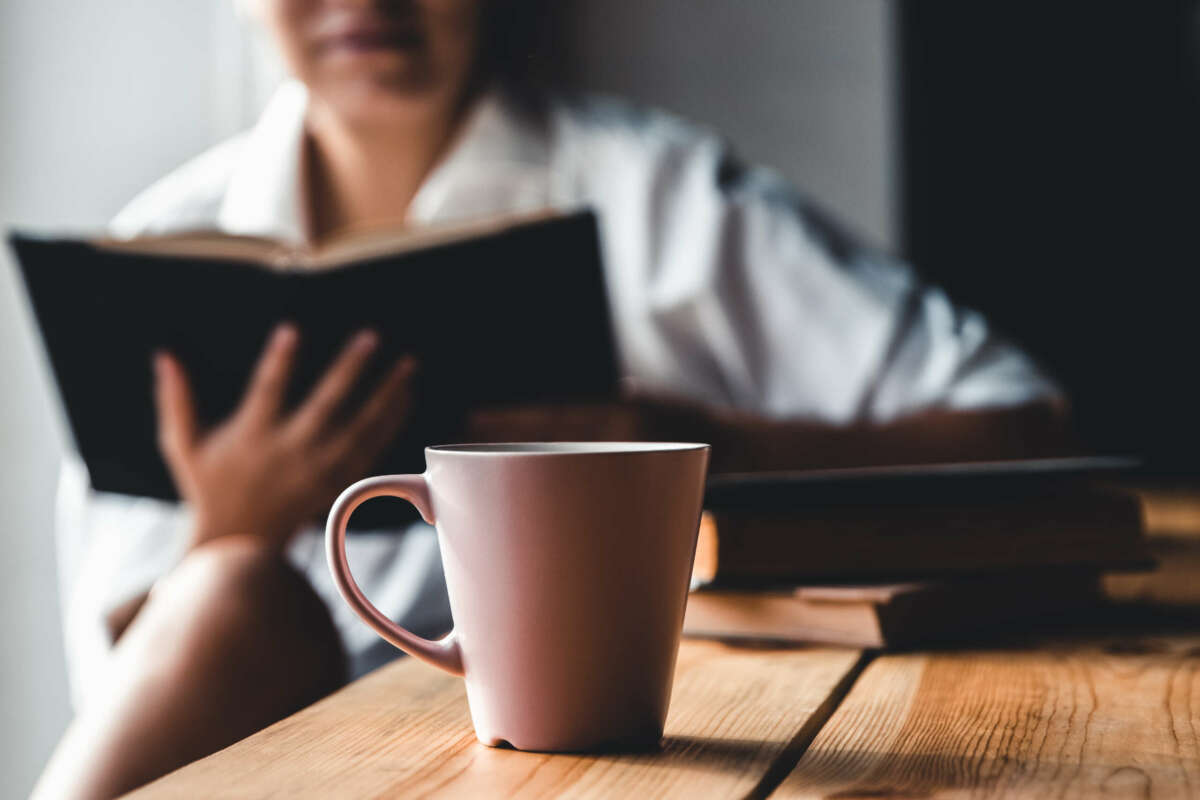What new books did we value the most this year? Which ones would we recommend to dear friends and family as we settle into the year-end holiday break and curl up with a big pile of books? We’ll have lots of time to read in the coming weeks, and happily there are a lot of great books out there. What to read right now among the best new books of the year 2020? In fiction, poetry, essays, memoirs and other non-fiction, here are our picks for the 20 best books of 2020. What’s on your list?
what are the best 20 books of 2020 in fiction and non-fiction?
If there was any silver lining in the stay-at-home, travel-restricted, socially distant days of 2020, it’s that we had plenty of time to read.

We’re grateful for many things and one of them is that in this interminable and difficult year, we’ve been made newly grateful for the micro-luxury of reading a great book.
[white_box]Join our community
For access to insider ideas and information on the world of luxury, sign up for our Dandelion Chandelier newsletter. And see luxury in a new light.
sign up now >
[/white_box]
We turn to art and culture for insight, solace, inspiration and a sense of connection. And this year, for months on end we weren’t able to visit art museums, see a play, attend a concert or watch a live dance performance in a community of others.
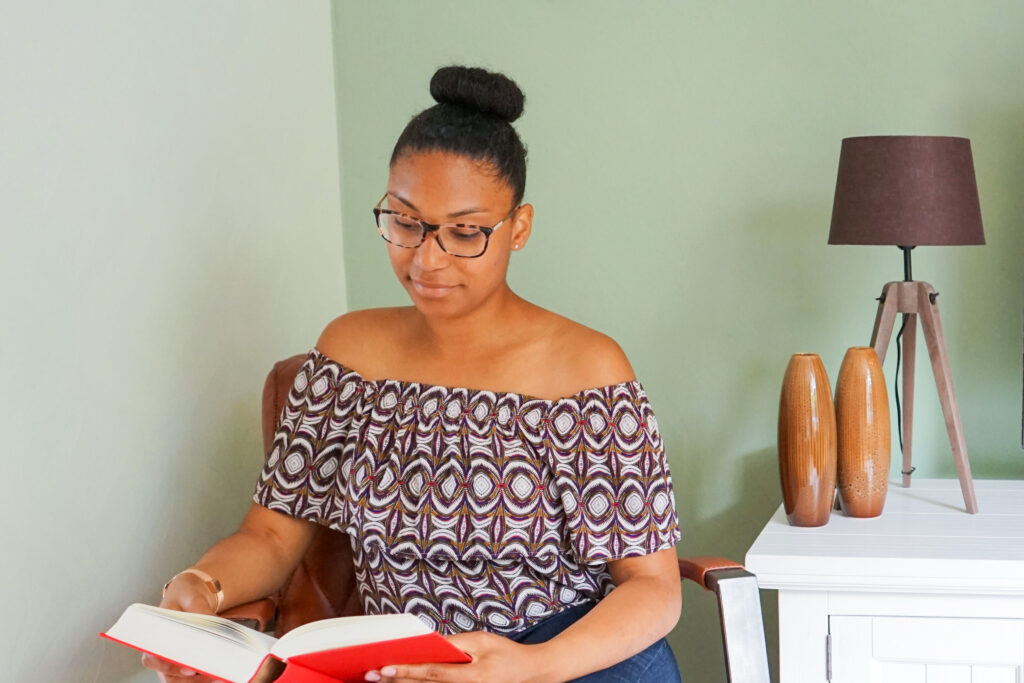
The 20 best books of the year 2020 in fiction and non-fiction.
But one thing coronavirus could not take from us? A good book.
In the midst of grief, loss, protest and disappointment, this year has forced us to acknowledge once again the power of books to generate empathy. To increase our knowledge and understanding. To give us courage. Unleash catharsis. And provide us a few precious moments of pure joy.
It was difficult to narrow our list down this year — and we’re sure that we’ve left some great books out. With that caveat, here are our picks for the 20 best books of the year for 2020.
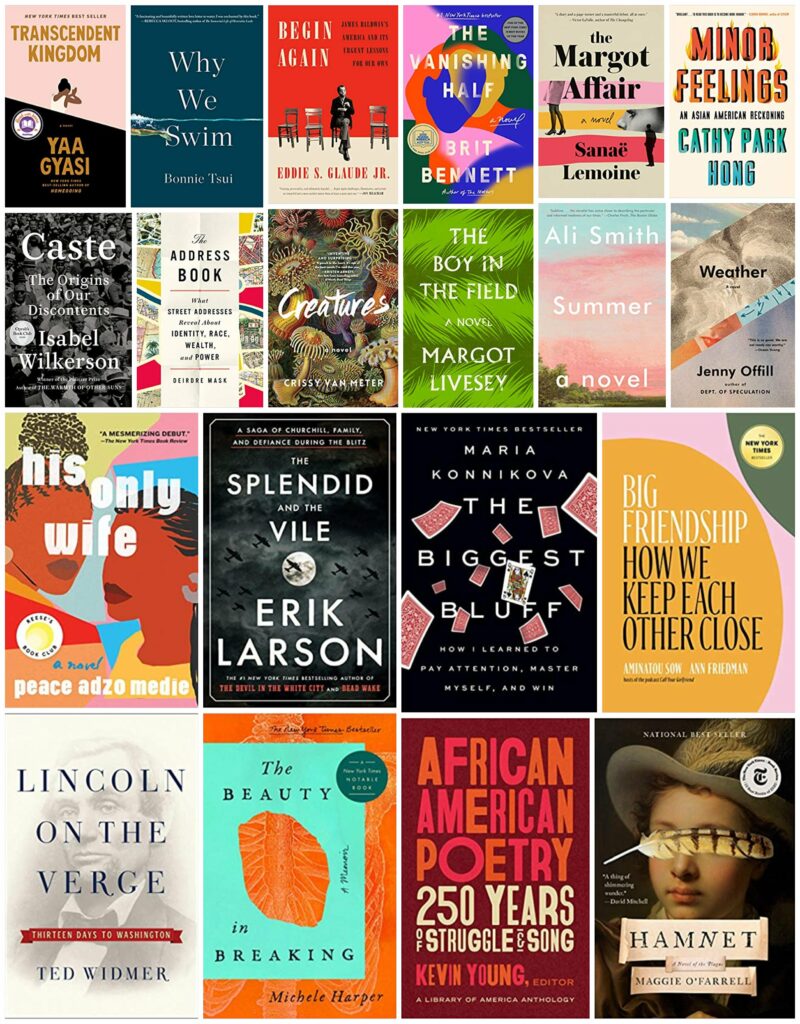
The 20 best books of the year 2020 in fiction and non-fiction. Courtesy Photos.
the best books of 2020: the top 10 in Fiction
1. The Vanishing Half by Brit Bennett.
The brilliant author of The Mothers returns in this stunning novel with the tale of two black twin sisters raised in the Deep South in a town that prizes fair-skinned African-Americans above all else. They run away at age 16, and years later we find them living parallel and completely separate lives. One twin lives with her black daughter in the same southern town she once tried to escape. The other twin secretly passes for white, and her white husband knows nothing of her past.
When their daughters meet and begin to learn more about each other, the essential questions come to a head: what is identity, and how much of it is how we define ourselves? Is it ever morally acceptable to “pass” in a world where race has such raw power? Drawing on a long and tragic history of blacks in America, this novel is completely of this moment. And yet filled with timeless, fundamental questions.
2. Weather by Jenny Offill.
Weather is a worthy follow-up to the author’s austere and quietly devastating first novel, Dept. of Speculation. As with that book, this one tackles the essential fears and occasional joys of urban family life with dry wit and surgical precision. The topic this time is climate change, and what a reasonable response to such an earth-shattering actually looks like
As we go on with the messy business of raising children, trying to make a living, and rescuing our family members from their longtime demons, what are we to do about global warming? And does anything we can do actually matter?
Said another way: “what does it mean to keep tending your own garden once you’ve seen the flames beyond its walls?” It sounds dark, but it’s not – it’s provocative and honest. And you’ll be thinking about it long after you’re done reading.
3. The Margot Affair by Sanaë Lemoine.
In the debut novel The Margot Affair, we spend a year in the lives of a single mother and her teenage daughter in the swanky precincts of the Left Bank of Paris. Near the Luxembourg Gardens, Margot and her mother (a famous actress in the mold of Catherine Deneuve) spot the wife of Margot’s father – a politician on the rise with a spouse and children known to the public. They are his second, secret family – living in an apartment paid for by Margot’s father that they could never otherwise afford. That day, something in Margot snaps as she contemplates what life would be like if her father would only publicly claim her as his own.
As she and her best friend study for the Baccalaureate exams that will determine their futures, Margot is seduced by a journalist and her husband into sharing the secrets of her family life. When the story goes public, a string of events that no one could have expected unfolds. And it becomes essential to understand exactly what family, parenthood, loyalty and devotion really mean.
It’s frank and funny and ultimately deeply moving, and in many ways is a perfect companion read with The Mothers by Brit Bennett. Who stays, and who goes, when life gets really, truly hard? This brilliant novel will leave you thankful for those rare people in your life who will literally do anything for you. Sometimes that person is your mother.
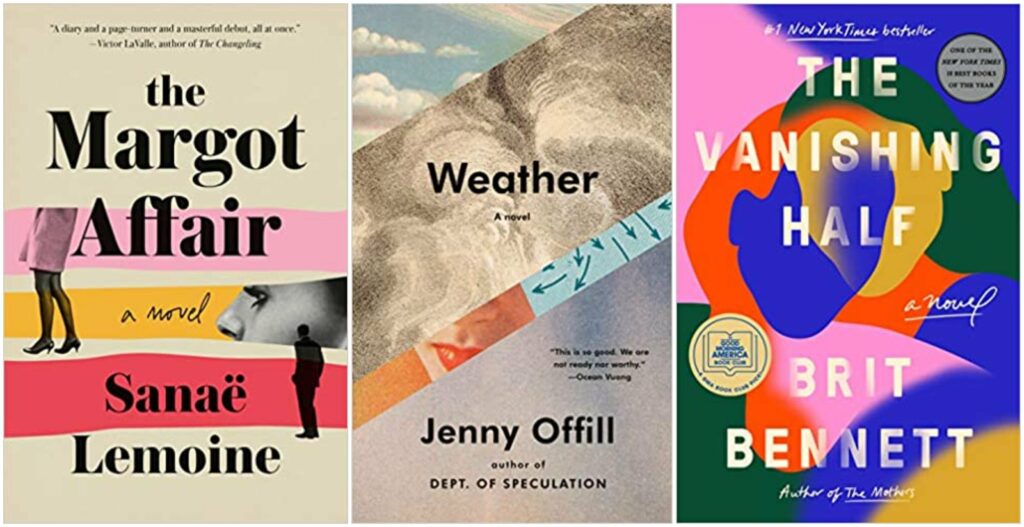
The 20 best books of the year 2020 in fiction and non-fiction. Courtesy Photos.
4. Transcendent Kingdom by Yaa Gyasi.
Gyasi is best known for her bestselling debut novel, Homegoing. In this sophomore novel, she brings the same precision and lyricism to a different kind of family and a different definition of home. Gifty is . . . well, gifted. A young black woman working in a graduate student lab at Stanford, Gifty has become consumed with research into the nature of addiction. That’s the direct result of the tragic death of her adored older brother (and only sibling) from a drug overdose after he becomes addicted to opioids after a sports injury. In the aftermath, her stern mother struggles with debilitating depression, despite being deeply devoted to her evangelical local church. They are an immigrant family, originally from Ghana, transplanted to a small city in Alabama and battered by the race and class barriers that await them in America.
This deeply moving novel addresses the hard questions of life: why do some people become depressed or addicted? Why do some run away from their problems, leaving others behind to fend for themselves? How do we maintain our faith in the light of suffering from deep emotional wounds? Is science any better at explaining the mysteries of human behavior than religion? Can anything actually explain it?
The author grew up in Alabama in the same town in which this novel is set. So perhaps it is “auto-fiction” – autobiography disguised as fiction. It matters not. This is a remarkable and earnest exploration of childhood faith and the cold harsh realities of adulthood. In wrestling with suffering and fighting quite hard to hold onto hope, in Gifty we have a heroine who embodies what it means to want to believe in a world that seems determined to extinguish the small flame of hope lit inside her as a child. And her triumph becomes ours.
5. Summer by Ali Smith.
Summer is the final entry in Smith’s Seasonal Quartet. And unlike so many “final episodes,” where we are left feeling disappointed when a beloved cast of characters has to end their time with us, this conclusion to the series is brilliantly crafted, wrenching, poignant and true to the spirit of everything that has come before it. We’re not ashamed to say that it made us cry – they were good tears and well worth it.
It turns out that summer has a lot more to say than we ever realized. As does this author, who never seems to run short of insight and compassion for the way we are all living in the world right now.
6. Hamnet by Maggie O’Farrell.
In this pandemic year 2020, this piercing historical novel set during the Black Plague in 1580’s England has special resonance. Agnes has special gifts as a healer, and when she settles into domestic life with her husband in Stratford-upon-Avon, she is known as a wonderful mother and also as the “secret weapon” of her playwright husband, whose career in the theater in London is just beginning to take off.
Then tragedy strikes. And when they lose their beloved son Hamnet, will they also lose their marriage and any hope of happiness in this life? It cuts very close to the bone, and yet the prose is so lush and the emotions so true that even in the depths of 2020, this was an essential read.
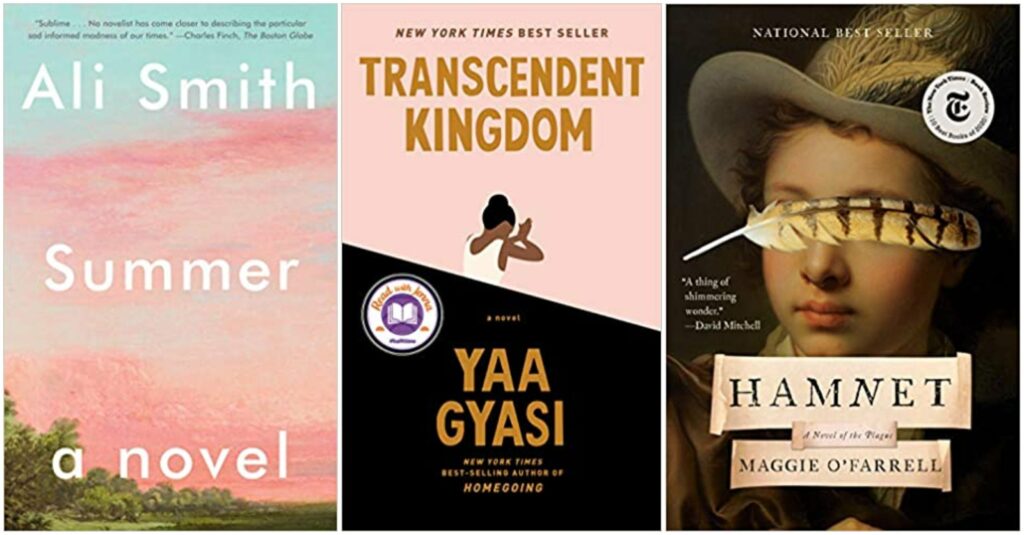
The 20 best books of the year 2020 in fiction and non-fiction. Courtesy Photos.
7. His Only Wife by Peace Adzo Medie.
In the debut novel His Only Wife, Afi Tekple is a young seamstress in Ghana; smart, pretty and betrothed to a man she’s never met. Her groom, Elikem, is a wealthy businessman whose mother has chosen Afi in the hopes that she will distract him from his relationship with a woman his family feels is “inappropriate.”
Her life in Accra, the capital of Ghana, quickly becomes filled with drudgery. She agreed to this life to give her mother the financial security she desperately needs. And so she must see it through. Right? This story of grit, spunk and moxie will make you feel ready to take on the world – as soon as you finish this delightful novel, that is.
8. Creatures by Chrissy van Meter.
In Creatures, we’re immersed in the milieu of the fictional Winter Island, off the coast of Southern California. Life there is governed by the weather, the tides, and the rhythms of sea creatures, animals and plants. We first meet 20-something Evie on the eve of her wedding, when her estranged mother turns up uninvited.
From there we move backward and forward in time, learning the story of the intense bond between Evie and her ramshackle father, who for a brief time made real money selling Winter Wonderland, a famous stain of weed grown only on the island. He’s loving, and also a mess – alcoholic, volatile and undependable. The sections of the story that illuminate this father-daughter relationship are among the strongest we’ve read anywhere. But this tale is full of satisfying surprises – brilliantly and quietly done.
9. The Boy in the Field by Margot Livesey.
As The Boy in the Field begins, it’s a typical afternoon in 1999, and three teenaged siblings are walking home from school when they discover a boy lying in a field, bloody and unconscious. Thanks to their intervention, the boy’s life is saved. But in the aftermath, all three find their lives upended. One becomes obsessed with finding the person who committed the crime. Another takes wild risks as she seeks both emotional connection and escape. And the youngest of the three, who is adopted, suddenly decides to find his birth mother.
Hanging over all of it is their parent’s strained marriage. It’s autumn – and in their family, it’s a season of change, and endings, and perhaps the promise of seeing the world clearly.
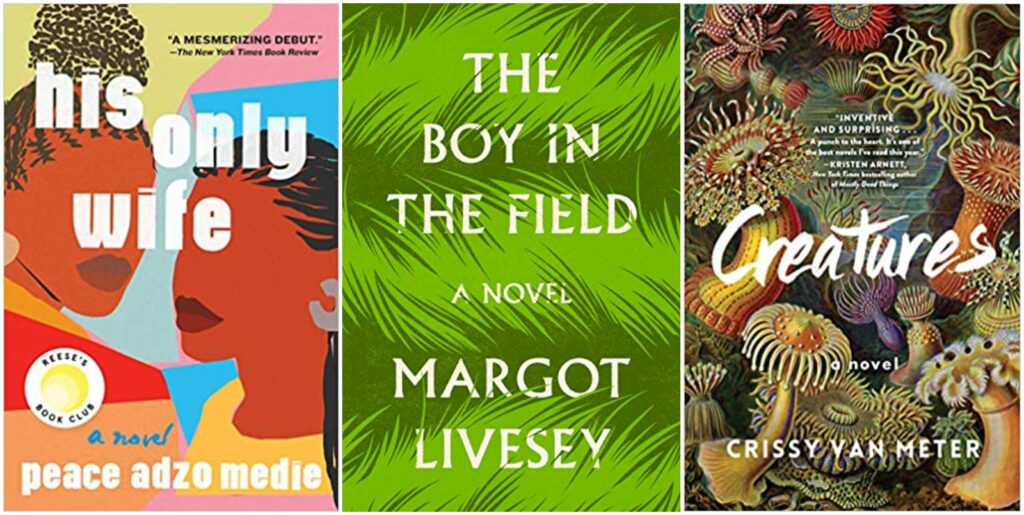
The 20 best books of the year 2020 in fiction and non-fiction. Courtesy Photos.
10. African-American Poetry: 250 Years of Struggle & Song, edited by Kevin Young.
In this highly-praised volume, poet Kevin Young curates the most extensive and most ambitious anthology of Black poetry ever published, gathering 250 poets from the colonial period to the present. From the Harlem Renaissance, through the Black Arts Movement and the Dark Room Collective, up to the current day, the breadth and depth of this compilation is astounding. It’s essential reading as poetry, as history, as activism – and as witness-bearing to the story of Black Americans in all of its richness, pain and triumph.
the best books of 2020: the top 10 in Non-Fiction
1. The Splendid and the Vile by Erik Larson.
If there’s one book that we really needed to read this year, it was The Splendid and the Vile: A Saga of Churchill, Family, and Defiance During the Blitz. Why? Because in the midst of Peak 2020 with the world seemingly turned upside down, we were seeking immersion in another time of global crisis – at a far more urgent pitch – that people managed to rally through and survive.
And what a marvelous book this is! Larson takes us into the bosom of the Churchill family, seen largely through the eyes of his daughter Mary. She’s on the cusp of adulthood and torn between her idyllic social weekends in the countryside and the growing terror and destruction of The Blitz in London. We also see this chapter in global history from the birds-eye view of a Luftwaffe fighter pilot. And from the Nazi’s lead propagandist. And from the emissaries from America, who have to decide whether or not to recommend that FDR throw his full support behind the British in their hour of need.
We all know how it turns out – but it’s fascinating to learn how they got it to turn out that way. There are some stories that seem too fantastical to be true – and yet they are (looking right at you, Rudolf Hess). You’ll come away wanting to know more about all of these players – especially Mary Churchill, who sounds like our kind of woman.
The quote from a wartime diary that gives this book its name is haunting. As is the memory of the suffering and valor of the Allies in the face of the unknown. This is a much-needed dose of courage for the road ahead, whatever it may bring.
2. Lincoln on the Verge: Thirteen Days to Washington by Ted Widmer.
If you have not joined the ranks of the those obsessed with and steeped in the lore of Abraham Lincoln, be warned: this book will take you there. It’s a fascinating and humane portrait of Lincoln before he took office. Specifically, this is the story of his 13-day train ride with his wife, children, close advisors and friends as he made his way East from Illinois to Washington DC. for his first inauguration.
Before he boards the train, there’s high suspense over whether his election will even be certified. Once it is, it becomes clear that this is an inauguration that Southerners – who have already named Jefferson Davis as their President – fully intend to prevent by any means necessary. A female spy learns of a murderous plot to assassinate Lincoln as the train passes through Baltimore. Sure, we know how it ends. But learning the details and the constant threat of violence that Lincoln faced – and hearing of the grace and wisdom he demonstrated under such pressure – will make you revere him in a way that perhaps you hadn’t before. Lincoln’s Presidency was even harder than most Americans know – and this pivotal moment for the salvation of our democracy came perilously close to not happening. It’s a lesson we forget at our peril.
3. Big Friendship: How We Keep Each Other Close by Aminatou Sow and Ann Friedman.
A close friendship is one of the most influential and important relationships a human life can contain. If 2020 has taught us anything, it’s that. In Big Friendship, two friends tell the story of their messy and life-affirming relationship.
It doesn’t hurt that the two are the hosts of the hit podcast Call Your Girlfriend. They’re well-practiced in sharing anecdotes with humor and candor. They coined the phrase “Big Friendship” to mean “a strong, significant bond that transcends life phases, geographical locations, and emotional shifts.” Having such a bond is one of the greatest joys of life – but forming and maintaining one takes real work and investment. Reading this will inspire you to nurture your Big Friendship(s) – and to fight for them if that’s what it takes.
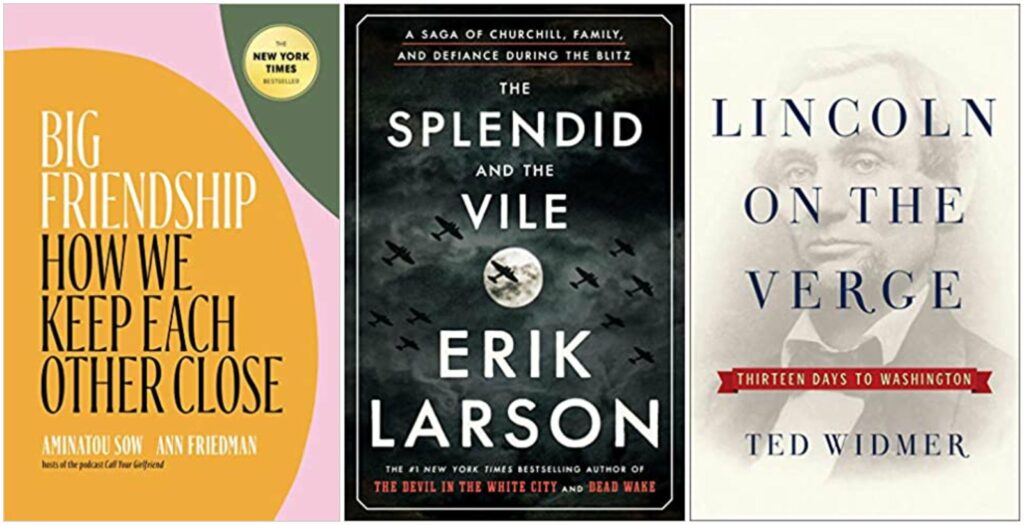
The 20 best books of the year 2020 in fiction and non-fiction. Courtesy Photos.
4. The Biggest Bluff: How I Learned to Pay Attention, Master Myself and Win by Maria Konnikova.
If you’re looking for a self-help book that is wildly entertaining and thought-provoking, you could hardly do better than The Biggest Bluff. Although she had already earned a Ph.D. in psychology, the author had never actually played poker before and didn’t even know the rules when she approached Erik Seidel, Poker Hall of Fame inductee, and convinced him to be her mentor. After a string of bad luck in her personal life, a colleague pointed her to poker as the ultimate master class in learning to distinguish between what can be controlled and what can’t.
She has quite a wild ride, learning to play poker, then starting to win meaningful money at it. She ends up as the subject of glowing profiles and TV appearances. But in the end, she pushes back from the table to consider what she’s learned. The key message? The biggest bluff of all is that skill is enough. In truth, bad cards will come our way. But keeping our focus on how we play them – and not on the outcome – will keep us moving, until the luck breaks our way again.
5. Why We Swim by Bonnie Tsui.
It may seem obvious, but diving into this book will cause you to ponder this essential question: why do humans swim? The author, a swimmer herself, explores this element of human behavior in intriguing and enlightening ways. Using real-life examples as varied as Olympic champions; a Baghdad swim club that meets in Saddam Hussein’s palace pool; Japanese “samurai swimmers;” and an Icelandic fisherman who survives a six-hour swim after a shipwreck.
Humans, unlike other animals that are drawn to water, are not natural-born swimmers. We must choose to be taught, and despite the inherent dangers, more and more people in the world are choosing to swim for recreation and exercise than ever before. This is a great read to understand why.
6. Minor Feelings: An Asian-American Reckoning by Cathy Park Hong.
At a time when many of us are striving for empathy and understanding of our fellow citizens, there’s no better moment to pick up Minor Feelings. It’s a blend of memoir, cultural criticism, and history meant to illuminate the experiences of Asian-Americans.
The beating heart of this book is Hong’s theory of “minor feelings.” As the daughter of Korean immigrants, she grew up surrounded by feelings of shame, suspicion, and melancholy. Only later did she come to understand that these “minor feelings” occur within immigrants and “others” when American optimism contradicts their lived reality. This is an honest and probing account of how race plays out in America in a community that doesn’t always garner much attention in the media or in the halls of government. That alone makes this an essential read.
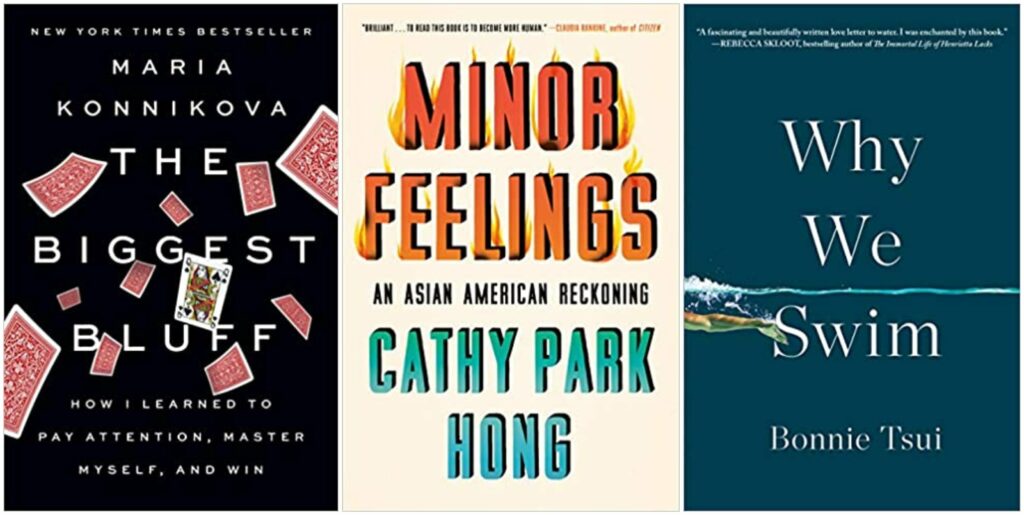
The 20 best books of the year 2020 in fiction and non-fiction. Courtesy Photos.
7. The Beauty in Breaking by Michele Harper.
This is a stunning and timely memoir from a wildly accomplished black woman physician. Harper is an emergency room physician, a profession that is still overwhelmingly male and white. Raised in Washington, D.C., she studied as an undergraduate at Harvard and met her husband there. They made it through medical school but he suddenly asked for a divorce just as she was embarking on her medical career.
So she arrives in the ER damaged herself. In this book, we learn how so many of the patients Harper treated taught her something important about recuperation and recovery. Ultimately, the experiences teach her how to make peace with the past. And to forge a new, hopeful future.
8. The Address Book: What Street Addresses Reveal About Identity, Wealth, Race and Power by Deirdre Mask.
The Address Book is an entertaining and informative read about a topic that most of us have probably never thought about before. What is the purpose of street names and addresses?
When most people think about street addresses, they assume they exist to ensure that the postman can deliver mail or a visitor can find her destination. But it turns out that in many parts of the world, your address can reveal everything there is to know about your race and class.
The author looks at this issue in a number of fascinating ways, including the fate of streets named after Martin Luther King Jr. The wayfinding means of ancient Romans. And how the names of Nazis still haunt the streets of modern Germany. Of course, the flipside of having an address is not having one. Millions of people today don’t, including those who live in the slums of Kolkata and on the streets of London.
It’s a strong argument that street names have real power: to name, to hide, to decide who counts and who doesn’t―and why.
9. Begin Again: James Baldwin’s America and Its Urgent Lessons for Our Own by Eddie Glaude.
As much as we may think we know about the great James Baldwin, in Begin Again, an outstanding work of history and social commentary, we learn so much more. In the years spanning from the publication of The Fire Next Time in 1963 to that of No Name in the Street in 1972, Baldwin transformed into a more overtly political writer. The end of the civil rights era and the violent assassinations of Martin Luther King Jr and Malcolm X caused Baldwin to reexamine his work. From the crucible of the late 1960’s, Baldwin emerged with a renewed sense of purpose and a different style of writing that cost him, both personally and professionally.
It’s a clarion call for us right now – to understand where we are as a nation – and to begin again with intention to keep bending the long curve of history toward justice.
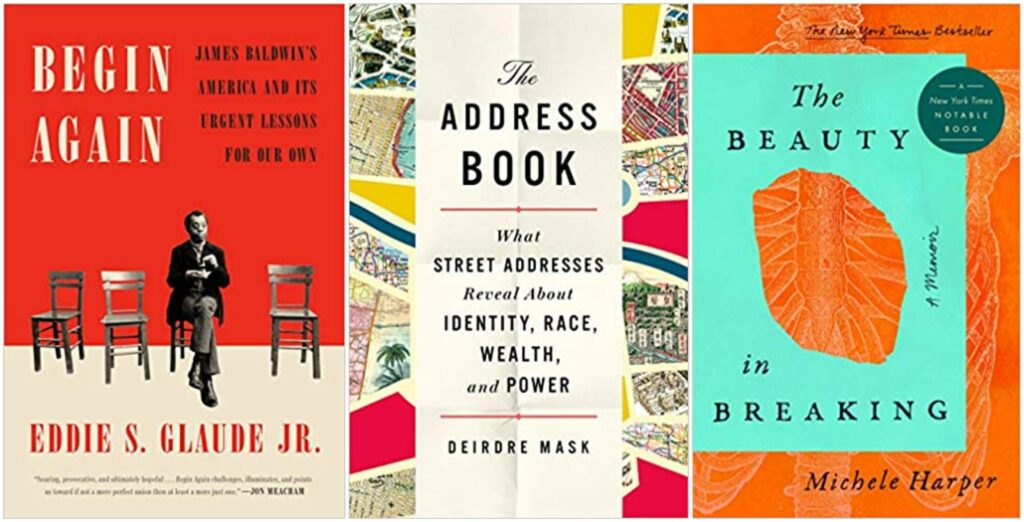
The 20 best books of the year 2020 in fiction and non-fiction. Courtesy Photos.
10. Caste: The Origins of Our Discontents by Isabel Wilkerson.
What do America, India and Germany have in common? One of the elements that you may not have considered before reading the Pulitzer Prize–winning writer’s latest book, Caste, is that each of these nations has had moments when their societies were rigidly governed by the rules of “caste.” The ruling members of those hierarchies would not have considered “race” to be the organizing principal – and yet we learn that there’s not a lot of difference in how those at the bottom of the hierarchy experience the stratification. Call it whatever you want. It’s pernicious and painful. It’s frequent also fatal.
As Wilkerson notes: “The hierarchy of caste is not about feelings or morality. It is about power—which groups have it and which do not.” She constructs a powerful argument that America today and throughout its history has been shaped by a hidden caste system, a rigid hierarchy of human rankings. One not dissimilar from the ones employed in Nazi Germany and in India.
She ends on a hopeful note, though: America can choose to make the unspoken rules of caste visible – and then do the hard work of making them disappear.
the 20 best books of the year 2020
That’s it. Our list of the 20 best books of 2020: fiction, essays and other non-fiction. To their authors, we say thank you for taking us on such transporting journeys.
And to you, dear reader, we suggest making your own Best of the Year list. It’s almost certain to reveal something about yourself that perhaps even you didn’t know. Happy New Year. And happy reading. Stay safe and healthy out there.

